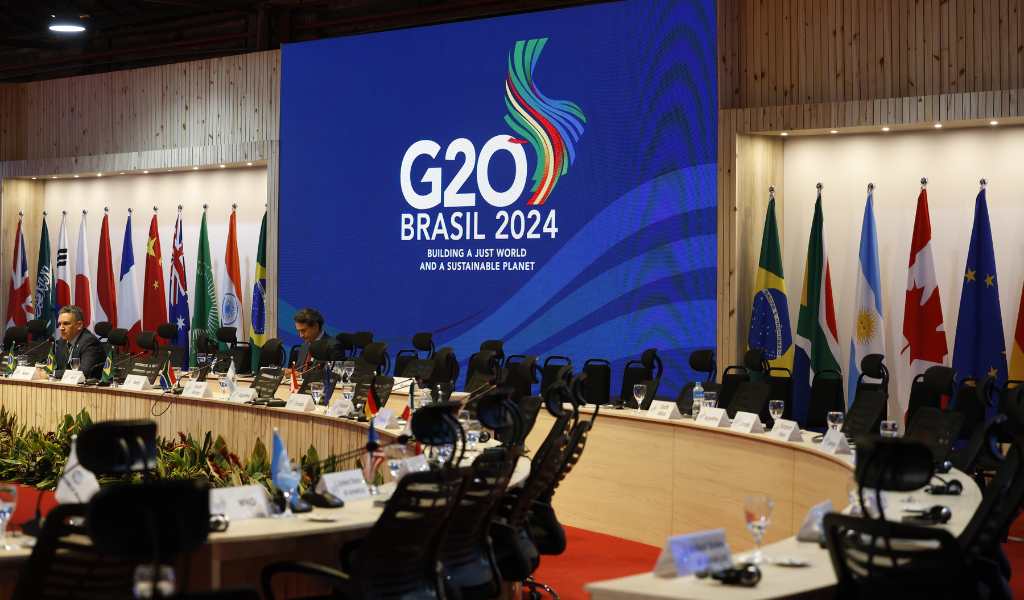The G20 summit has been held in Brazil this week, with global leaders discussing issues ranging from the economy to sustainable development and health to agriculture and climate change. In the months running up to the summit, IDS academics have worked with researchers from G20 member countries to develop new recommendations for policymakers on pressing global issues.

The recommendations are detailed in new policy briefs produced as part of the T20, which is the official G20 engagement group that brings together think tanks and research centres from G20 member countries, guest countries and organisations.
Policy briefs for sustainable development
The policy briefs cover important issues for sustainable development including, the transition to renewable energy, the role of voices from the global South in international development cooperation and leveraging digital innovations to improve tax systems. They include:
A North-South Agenda for the Renewables Challenge: Ensuring Sustainable Supply Chains, Equitable Green Development and Transparency Standards
With partners from Argentina and the USA, IDS researcher Anabel Marin, co-authors this brief outline the importance of ensuring just energy transitions. It recommends that to ensure a just tripling of renewable energy capacity, it is crucial to promote sustainable supply chains, provide equitable access to finance and technology, create opportunities for industrial capacity-building, and strengthen transparency, accountability, and anti-corruption policies.
Shifting Norms, Multiplying Actors, and Empowering Voices from the Global South: The G20’s Role in Shaping the Emerging Landscape of International Development Cooperation
Peter Taylor, acting director at IDS has co-authored this brief with a range of co-authors, including from Southern Voice on the important role that voices from the Global South have in setting the agenda, priorities, and potential solutions to the major challenges of a growing community of actors.
The recommendations for G20 members are: (1) prioritise inclusion and participation throughout the process of norm determination; 2) build upon existing norm deficiencies; 3) put in place a strong monitoring structure such as a G20 agreements observatory and 4) engage with other international development cooperation policy spaces to ensure universal adherence to established norms.
Tax policy recommendations
The IDS-hosted International Centre for Tax and Development (ICTD) has produced policy briefs relating to tax for G20 leaders, as part of IDS’ involvement in the T20. These include:
Taxing Informal Workers Fairly to Reduce Inequality and Support Inclusion
In this brief, ICTD Informality and Tax co-leads, and IDS researcher Max Gallien and Vanessa van den Boogaard, together with Nana Akua Anyidoho (University of Ghana) and Michael Rogan (Women in Informal Employment: Globalising and Organising) wrote about how the G20 can support fairer taxation of the informal sector by extending social protection to informal workers and promoting progressive taxation, among others.
A Fairer Global Tax Architecture
ICTD Research Director Martin Hearson and Associate Postdoctoral Fellow Frederik Heitmüller, along with Mbakiso Magwape (International Monetary Fund and formerly a postdoctoral fellow at ICTD) and Suranjali Tandon (National Institute of Public Finance and Policy in New Delhi), explain how the G20 can strengthen perceived fairness and inclusivity within international tax standards. This, in the context of ongoing negotiations for a new UN Framework Convention on International Tax Cooperation.
From Crisis to Reform: How the G20 Can Support the Reform of the International Financial Architecture to Unlock Private Capital for Low-Income, Resource-Rich Economies in Africa
Christopher Heitzig, Postgraduate researcher at IDS has co-authored this brief that proposes ways the G20 can help African low-income resource-rich countries become properly resourced to meet climate needs, capitalize on public-private partnerships and restructure the global financial architecture to work for Africa. It highlights the crucial role of the G20 in providing de-risking vehicles that spur private investment in Africa, especially through provision of technical assistance and expanding public information on mineral reserves.
Policy briefs on food systems
There have also been policy briefs on inequality, food systems and hunger, produced by IDS researchers as part of the Food Equity Centre, that contribute towards launch of the Global Alliance Against Hunger and Poverty – a cornerstone of Brazil’s G20 presidency.
Read the briefs on food systems
